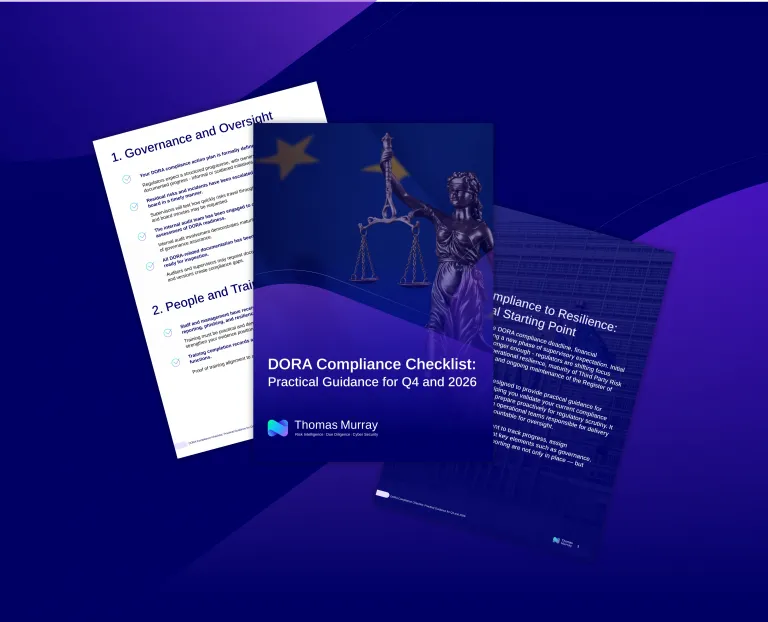Information current as at 21 August 2025
This newsletter features a carefully curated range of timely news stories and significant industry updates from across the institutional digital asset ecosystem. Our opening selection draws directly from Thomas Murray’s proprietary market intelligence, curated exclusively for clients as part of our comprehensive monitoring solutions. The following highlights are selected industry developments, providing wider market context and actionable insights we consider valuable for industry professionals.
Thomas Murray's Generated Insights
The Malta Financial Services Authority has Released its Position Paper on the Tokenisation of Collective Investment Scheme Issued Fund Units
The Malta Financial Services Authority (MFSA) has issued a paper on its approach to the tokenisation of fund units issued by Collective Investment Schemes (CIS).
The paper explains how tokenisation can facilitate seamless transfers and enable more cost-effective issuance of units of CISs, addressing the settlement inefficiencies in traditional CIS systems.
The paper emphasises the importance of the fund administrator's role in the tokenisation process. This role encompasses key responsibilities, including implementing Anti-Money Laundering (AML) and Know Your Customer (KYC) procedures. Additionally, the fund administrator must provide essential information and outline obligations related to trading tokenised fund units, as well as the applicable transparency requirements.
The Bank of Japan Publishes its CBDC Pilot Programme Progress Report
The Bank of Japan (BOJ) has published a report summarising the progress made on the Central Bank Digital Currency (CBDC) pilot programme as of May 2025. The pilot programme continues to be guided by two core pillars:
- The development and testing of the experimental CBDC system.
- Practical discussions with private businesses related to retail payments, including through the activities of the CBDC Forum and its Working Groups.
In the pilot programme's system, additional functions such as scheduled transfer and debit transfer have been implemented alongside the existing basic functions of issuance/redemption, payout/acceptance, and credit transfers.
Astana International Exchange (AIX) Announces First Spot Bitcoin ETF Listing
AIX, a prominent trading platform in Central Asia, has marked a major breakthrough in digital finance by successfully listing the region's first publicly traded Bitcoin ETF, thereby reaffirming its dedication to pioneering innovative financial solutions.
This development is poised to drive growth in the region's financial sector, with AIX expanding investment opportunities through the introduction of this ETF, reinforcing its regional position as a leader in digital finance.
Bolivia’s Central Bank and El Salvador's National Commission for Digital Assets Sign Memorandum of Understanding
In a landmark agreement, the Bolivian Central Bank (BCB) and El Salvador's National Commission for Digital Assets (CNAD) have joined forces, signing a Memorandum of Understanding (MoU) on 30 July 2025.
This collaborative pact establishes a framework for bilateral cooperation, enabling the exchange of vital information, regulatory expertise, and technical know-how on digital assets.
SFC Issues Circular on Minimum Expected Standards for VATP Operators
The Hong Kong Securities and Futures Commission (SFC) has taken a decisive step, issuing a circular on 15 August 2025 that establishes robust regulatory requirements for Virtual Asset Trading Platform (VATP) operators. This aims to enhance the oversight and governance of the digital asset trading landscape in Hong Kong.
The guidelines focus on ensuring the secure custody of client virtual assets, providing a robust framework for effective protection and management of these assets. Recommendations include establishing and managing client cold wallet infrastructure, using third-party wallet solutions, and the implementation of real-time threat monitoring systems, among other measures.
The Bank for International Settlement Publishes its Approach to Crypto Assets' AML
The Bank for International Settlements (BIS) has published a bulletin articulating an approach for Anti-Money Laundering (AML) compliance for crypto assets. The international financial institution highlights the fundamental conflict between established AML compliance and the architecture of crypto assets.
Current regulations depend on financial intermediaries to monitor transactions. Whereas permissionless public blockchains enable pseudonymous transfers between unhosted wallets (allowing users to store and manage their digital assets independently) outside this oversight.
Additional Noteworthy Market Developments
HKMA Outlines Regulatory Regime for Stablecoin Issuers
The Hong Kong Monetary Authority (HKMA) has established a comprehensive regulatory framework for stablecoin issuers, complete with detailed guidelines and explanatory notes.
This new regime mandates that all stablecoin issuers adhere to stringent licensing, anti-money laundering, and operational requirements. While the application process for licences is now open, the HKMA has clarified that no licences have been issued to date. They urge both industry stakeholders and the public to remain vigilant when encountering claims of regulatory compliance or licensed status.
Hong Kong to Issue First Stablecoin Licences in Early 2026, Despite Stablecoin Legislation in Effect From 1 August 2025
Despite Hong Kong’s stablecoin legislation having taken effect on 1 August 2025, the Hong Kong Monetary Authority (HKMA) has announced that no licences will be issued until 2026.
This news comes amid a Reuters report that a notable surge in fundraising activity was observed in July. At least ten Hong Kong-listed companies collectively secured over USD1.5 billion through share placements, earmarking these funds for strategic investments in emerging areas such as stablecoin development, digital asset expansion, and blockchain-powered payment solutions.
The European Banking Authority Details Draft Crypto Capital Rules for Banks
The European Banking Authority (EBA) has released its final draft Regulatory Technical Standards (RTS). They provide comprehensive guidelines for financial institutions to assess and mitigate the risks associated with their crypto-asset exposures, in accordance with the European Union's Capital Requirements Regulation (CRR) framework.
These draft RTS further specify capital requirements for various risks associated with asset-referenced tokens and other crypto-asset exposures, including unbacked crypto-assets like Bitcoin.
Wyoming Pioneers US State-Issued Stablecoin with Landmark Launch
Following the recent passage of the GENIUS Act, the US state of Wyoming has introduced the first production-grade government-issued digital asset on a public blockchain. The Wyoming Stable Token Commission, in partnership with the blockchain platform Avalanche and payments provider Rain, launched the Frontier Stable Token (FRNT), which is pegged to the US dollar and can be used for real-world transactions.
FRNT is a fully collateralised digital token backed by short-duration US Treasury bills and US dollars, with a statutorily-mandated 102% reserve requirement.
BNP Paribas Joins Fnality, Settles DLT Swap with Lloyds
BNP Paribas has become the latest participant in the Sterling Fnality Payment System (£FnPS) network. Shortly after joining, BNP Paribas completed an on-chain interest rate swap payment with Lloyds through the £FnPS, showcasing how DLT supports real-time, risk-free settlement of complex financial instruments.
Fnality provides a central bank-regulated, DLT-based wholesale payment system using an asset with central bank money credit characteristics. This innovation enables seamless movement of cash, collateral, and assets across interoperable platforms.
Paxos Agrees $48.5m New York Settlement over Binance-related AML Failures
A regulatory crackdown has resulted in Paxos, a prominent crypto infrastructure firm, facing a significant settlement with the New York Department of Financial Services (NYDFS) after it failed to perform adequate due diligence on its partnership with Binance. The settlement, worth USD 48.5 million, underscores the regulator's commitment to enforcing stringent anti-money laundering and compliance standards in the cryptocurrency sector.
Transactions worth USD 1.6 billion were found to have flowed to, or from, the platform involving unlawful actors via the Binance USD stablecoin. Paxos agreed to pay a USD 26.5 million penalty and will spend an additional USD 22 million to overhaul its compliance programme.
Trump Signs Order Allowing Crypto in 401(k) Retirement Plans
In a move that underscores the Trump administration's growing support for digital assets, a recent executive order signed by the President seeks to pave the way for the inclusion of cryptocurrencies and alternative assets in 401(k) retirement plans.
This development is poised to unlock access to trillions of dollars in American retirement savings, enabling fund managers to diversify investments beyond traditional assets such as stocks, bonds, and cash, and into alternative assets, including digital currencies.
Industry Leaders Urge Basel Committee to Reassess Cryptocurrency Risk Guidelines
Financial trade groups are urging the Basel Committee on Banking Supervision (BCBS) to reconsider its proposed standards for banks' exposure to cryptocurrencies. They argue that the overly conservative rules could stifle innovation and are based on outdated assumptions about the rapidly evolving industry.
The groups recommend a more nuanced, risk-based approach that recognises the differences between various crypto assets and their associated risks. They hope to influence the BCBS to create fair and effective rules that don't hinder the growth of the crypto industry, with final standards expected by the end of 2025.

Digital Asset Custodian Monitoring
Our DACM solution sets a standard for transparency and risk intelligence in digital markets. Against an industry that is complex, fragmented, unstandardised, and fraught with cyber risk, our solution provides you with the tools and insights to effectively evaluate, select and monitor your digital asset custodian.
Let’s Talk
Interested in strengthening your approach to digital asset custody?
Get in touch to request a demo, or to talk to one of our experts to find out how Thomas Murray can support your risk evaluation, monitoring, and strategy execution in the digital asset space.
Insights

How Private Equity Hackers Choose Their Targets
Private equity firms sit at the intersection of high-value financial transactions, sensitive deal data, and an expanding portfolio of technology heavy portfolio companies – and it’s this combination that makes PE an attractive target for cyberthreat actors.

5 Key Takeaways from a Deal Hacker: What PE Firms Should Look for When Doing Cyber Deal Due Diligence
Are your private equity deals safe from cybercriminals? The answer is very much ‘no’. Deals are being compromised, money is being lost, and reputations are being affected.

Why Cybersecurity Due Diligence is Critical to Deal Completion
It’s a common story: after months of meticulous financial, operational, and market analysis, a critical finding emerges in the final weeks before deal closure – threatening what seemed like a near-certain transaction with a three-month delay.


